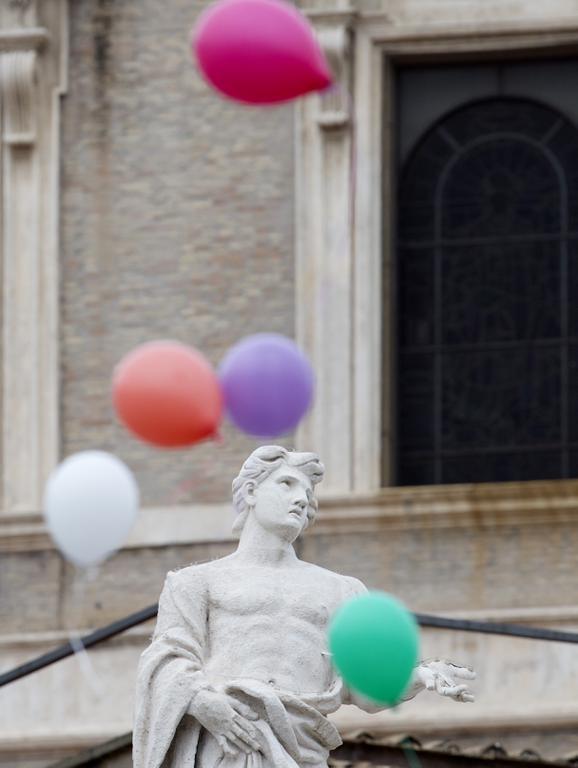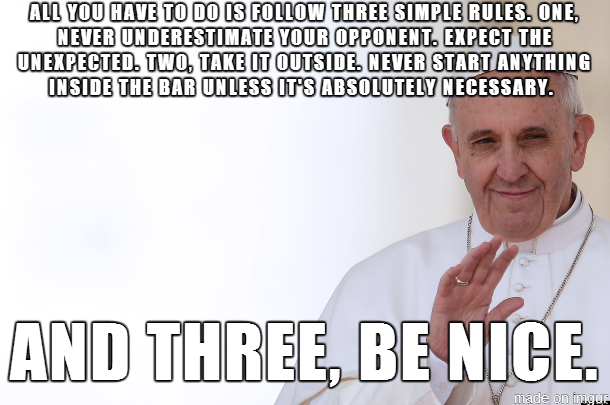
(Vatican Radio) Celebrating Mass in Manila’s Cathedral on Friday, Pope Francis urged Catholics in the Philippines to be ambassadors for Christ and ministers of reconciliation, proclaiming the Good News of God’s infinite love, mercy and compassion. Speaking to bishops, priests, religious and seminarians gathered in the Cathedral, the Pope said the Church in the Philippines is called to acknowledge and combat the causes of the deeply rooted inequality and injustice which mar the face of Filipino society, plainly contradicting the teaching of Christ.
As Filipinos prepare to mark the fifth century of the arrival of the Church in the Asian nation, the Pope said Catholics must build on that legacy of the past by building a society inspired by the Gospel message of charity, forgiveness and solidarity in the service of the common good.
Below the full text of Pope Francis’ homily for the Mass in Manila’s Cathedral
Mass with Bishops, Priests and Religious in Manila’s Cathedral of the Immaculate Conception
16 January 2015
“Do you love me?… Tend my sheep” (Jn 21:15-17). Jesus’ words to Peter in today’s Gospel are the first words I speak to you, dear brother bishops and priests, men and women religious, and young seminarians. These words remind us of something essential. All pastoral ministry is born of love. All consecrated life is a sign of Christ’s reconciling love. Like Saint Therese, in the variety of our vocations, each of us is called, in some way, to be love in the heart of the Church.
I greet all of you with great affection. And I ask you to bring my affection to all your elderly and infirm brothers and sisters, and to all those who cannot join us today. As the Church in the Philippines looks to the fifth centenary of its evangelization, we feel gratitude for the legacy left by so many bishops, priests and religious of past generations. They labored not only to preach the Gospel and build up the Church in this country, but also to forge a society inspired by the Gospel message of charity, forgiveness and solidarity in the service of the common good. Today you carry on that work of love. Like them, you are called to build bridges, to pasture Christ’s flock, and to prepare fresh paths for the Gospel in Asia at the dawn of a new age.
“The love of Christ impels us” (2 Cor 5:14). In today’s first reading Saint Paul tells us that the love we are called to proclaim is a reconciling love, flowing from the heart of the crucified Savior. We are called to be “ambassadors for Christ” (2 Cor 5:20). Ours is a ministry of reconciliation. We proclaim the Good News of God’s infinite love, mercy and compassion. We proclaim the joy of the Gospel. For the Gospel is the promise of God’s grace, which alone can bring wholeness and healing to our broken world. It can inspire the building of a truly just and redeemed social order.
To be an ambassador for Christ means above all to invite everyone to a renewed personal encounter with the Lord Jesus (Evangelii Gaudium, 3). This invitation must be at the core of your commemoration of the evangelization of the Philippines. But the Gospel is also a summons to conversion, to an examination of our consciences, as individuals and as a people.
As the Bishops of the Philippines have rightly taught, the Church in the Philippines is called to acknowledge and combat the causes of the deeply rooted inequality and injustice which mar the face of Filipino society, plainly contradicting the teaching of Christ. The Gospel calls individual Christians to live lives of honesty, integrity and concern for the common good. But it also calls Christian communities to create “circles of integrity”, networks of solidarity which can expand to embrace and transform society by their prophetic witness.
As ambassadors for Christ, we, bishops, priests and religious, ought to be the first to welcome his reconciling grace into our hearts. Saint Paul makes clear what this means. It means rejecting worldly perspectives and seeing all things anew in the light of Christ. It means being the first to examine our consciences, to acknowledge our failings and sins, and to embrace the path of constant conversion. How can we proclaim the newness and liberating power of the Cross to others, if we ourselves refuse to allow the word of God to shake our complacency, our fear of change, our petty compromises with the ways of this world, our “spiritual worldliness” (cf. Evangelii Gaudium, 93)?
For us priests and consecrated persons, conversion to the newness of the Gospel entails a daily encounter with the Lord in prayer. The saints teach us that this is the source of all apostolic zeal! For religious, living the newness of the Gospel also means finding ever anew in community life and community apostolates the incentive for an ever closer union with the Lord in perfect charity. For all of us, it means living lives that reflect the poverty of Christ, whose entire life was focused on doing the will of the Father and serving others. The great danger to this, of course, is a certain materialism which can creep into our lives and compromise the witness we offer. Only by becoming poor ourselves, by stripping away our complacency, will we be able to identify with the least of our brothers and sisters. We will see things in a new light and thus respond with honesty and integrity to the challenge of proclaiming the radicalism of the Gospel in a society which has grown comfortable with social exclusion, polarization and scandalous inequality.
Here I would like to address a special word to the young priests, religious and seminarians among us. I ask you to share the joy and enthusiasm of your love for Christ and the Church with everyone, but especially with your peers. Be present to young people who may be confused and despondent, yet continue to see the Church as their friend on the journey and a source of hope. Be present to those who, living in the midst of a society burdened by poverty and corruption, are broken in spirit, tempted to give up, to leave school and to live on the streets. Proclaim the beauty and truth of the Christian message to a society which is tempted by confusing presentations of sexuality, marriage and the family. As you know, these realities are increasingly under attack from powerful forces which threaten to disfigure God’s plan for creation and betray the very values which have inspired and shaped all that is best in your culture.
Filipino culture has, in fact, been shaped by the imagination of faith. Filipinos everywhere are known for their love of God, their fervent piety and their warm devotion to Our Lady and her rosary. This great heritage contains a powerful missionary potential. It is the way in which your people has inculturated the Gospel and continues to embrace its message (cf. Evangelii Gaudium, 122). In your efforts to prepare for the fifth centenary, build on this solid foundation.
Christ died for all so that, having died in him, we might live no longer for ourselves but for him (cf. 2 Cor 5:15). Dear brother bishops, priests and religious: I ask Mary, Mother of the Church, to obtain for all of you an outpouring of zeal, so that you may spend yourselves in selfless service to our brothers and sisters. In this way, may the reconciling love of Christ penetrate ever more fully into the fabric of Filipino society and, through you, to the farthest reaches of the world.
Link to article: Pope urges Filipino Church to combat inequality and injustice
Related:
Pope tells PH leaders to end corruption,hear cries of the poor
Pope: We need to become poor ourselves
Pope Challenges Filipino Politicians to end ‘Scandalous Social Inequalities






 Ceremony: The Pope was taking part in a service devoted to peace alongside young children
Ceremony: The Pope was taking part in a service devoted to peace alongside young children











































